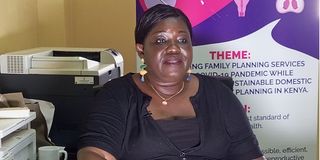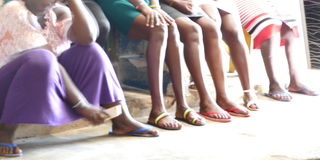Premium
Condom crisis: Busia sex workers ‘recycle’ condoms from dustbins
Commercial sex workers in Kenya and their clients are feeling the heat of the biting shortage of condoms
In Busia County, sex workers say they are compelled to use one condom on more than one client, collect used condoms from dustbins which they wash and reuse apart from ‘invading’ Ugandan shops to buy the commodity to protect themselves and their clients.
This comes after earlier this month Civil Society Organisations (CSOs) in the health sector disclosed that the country had once again run out of condoms. The same situation was witnessed at the beginning of the year.
While making the revelations ahead of the commemoration of World AIDS Day 2022
which is held on 1st December every year, Dr Samuel Kinyanjui who is the AIDS Healthcare Foundation (AHF) Kenya Country Director highlighted that there is a gap of about 112 million condoms, which translates to a budgetary hole of about Sh38 million, at a unit cost of approximately Sh3.4 per condom.
Speaking to the Nation in an exclusive interview, Eunice* who lost her husband in 2015 discloses that life went from bad to worse. She became the sole breadwinner of her family of seven.
Savings by the family quickly dried up, leaving her with few options to make ends meet. Humbled, she found a job as a bar attendant but in most cases, her employer would not pay her wages. Her struggles increased. She was unable to fend for her family.
"I made the bold decision of becoming a sex worker to take care of my family,” said Eunice.
Despite the dangers in the trade, she braved on but when Covid-19 hit the country, she says getting condoms to protect themselves against sexually transmitted diseases has become a problem. Sometimes, they use one condom twice.

Janerose Amoit Ambuchi Busia County Director of Health speaking in her office.
“I received a regular client who normally pays me well but on this day, he didn't have a condom. Most traders had run out of condoms in the Malaba border," she said.
She added: "I asked my friend for a condom and she didn't have one. I picked a used condom from the dustbin and washed it. I did this to protect myself."
Eunice to the room and gave the washed condom to her client. The condom would later burst. They however continued with their business and the following day, she went to a health facility to take PrEP to prevent herself from getting HIV.
The mother of seven children said that after three months she became sick and got treated for malaria but she didn't recover.
She said the nurse at the health facility asked her to take further tests. She was diagnosed with syphilis.
"When I contracted syphilis, I suffered. I told my client that he had infected me with a sexually transmitted disease but he denied it until I convinced him to go and get tested. The tests revealed that he had lived with dormant syphilis for 16 years," she said.
She added: “The government should give us condoms as those from Uganda are being sold between Sh100 and Sh400."
She said they charge their clients between Sh200 and Sh500 per session. She said that most of their clients are too shy to buy condoms.
She posed: "If a customer pays you Sh200 and you buy a packet of condoms at Sh100, where will you get money to pay rent and buy food for your children?”
She said that female condoms are unavailable.
Eunice said they have embraced family planning. She uses implants to avoid getting pregnant.
She says the use of condoms is an ideal family planning method besides protecting sex workers from contracting STIs.
Pauline*, also a widow, gave birth to her seventh child in September 2020. She, however, did not plan to get another child.

Commercial sex workers in Busia County. Condom shortage has hit the county.
She was impregnated by one of her longtime customers. Condoms were unavailable.
"The man also made me pregnant in 2018 after a condom burst. This was the sixth child," said Pauline.
She added: "I went for a five-year plan (implant) last year. At the end of the day, a condom is ideal as we have multiple sexual partners. Contraceptives can only help to prevent pregnancies but not HIV. We must protect ourselves and our clients."
Phanice*, also a sex worker at the Malaba border said she has been forced to wash used condoms for protection.
She lamented that condom dispensers in most health facilities in Busia County are empty. She is now four months pregnant after engaging in unprotected sex with a client.
"I used to carry condoms and lubricants when meeting my clients. Four months ago I met my client and I didn't have condoms. Because he used to pay me well, I could not allow him to go get sexual satisfaction elsewhere," said Phanice adding that she prefers condoms to other methods of family planning
Sylvia Epalat, a nurse at Busia Survivors Organization, said that the county has at least 4,000 sex workers.
She says that at least 3,000 of sex workers are on modern family planning methods like implants and IUCDs, among others, with condoms being the most preferred family planning method.
She said since the advent of Covid-19, the county has experienced a scarcity of condoms.
"Condom dispensers in the county are empty," said Ms Epalat.
Busia Director of Health, Janerose Amoit Ambuchi confirmed the scarcity of condoms in the county.
"We now need to have budgets to buy condoms. For commercial sex workers, routine condom use is a priority. Some of them are forced to cross into Uganda to buy condoms," said Ms Amoit.
She added: "Poverty index in Busia is at 83 per cent and this makes the key populations unable to buy condoms. Commercial sex workers need to be kept safe from new HIV infections. Family planning uptake in Busia is also very low."
Dr Kinyanjui cautioned that the country risks rolling back the gains made in HIV/AIDS response if the issue of condom shortage in the country is not addressed.
The expert further noted that over the years, HIV and AIDS prevalence has decreased from a peak of 10.5 per cent to a low of five per cent in recent years.
“We urge the government to come up with a mechanism of stemming the acute shortage of condoms that has now become routine.”
Experts say that new HIV infections are estimated to have declined in the last seven years; from about 116,000 in 2009 to around 45,000.
Civil Society Organisations raised concerns over a possibility of a new wave of infections citing a budgetary gap in the purchase of condoms. He observed that the government was procuring 150 million pieces of condoms against a forecasted demand of 262 million for the 2022/2023 financial year.






